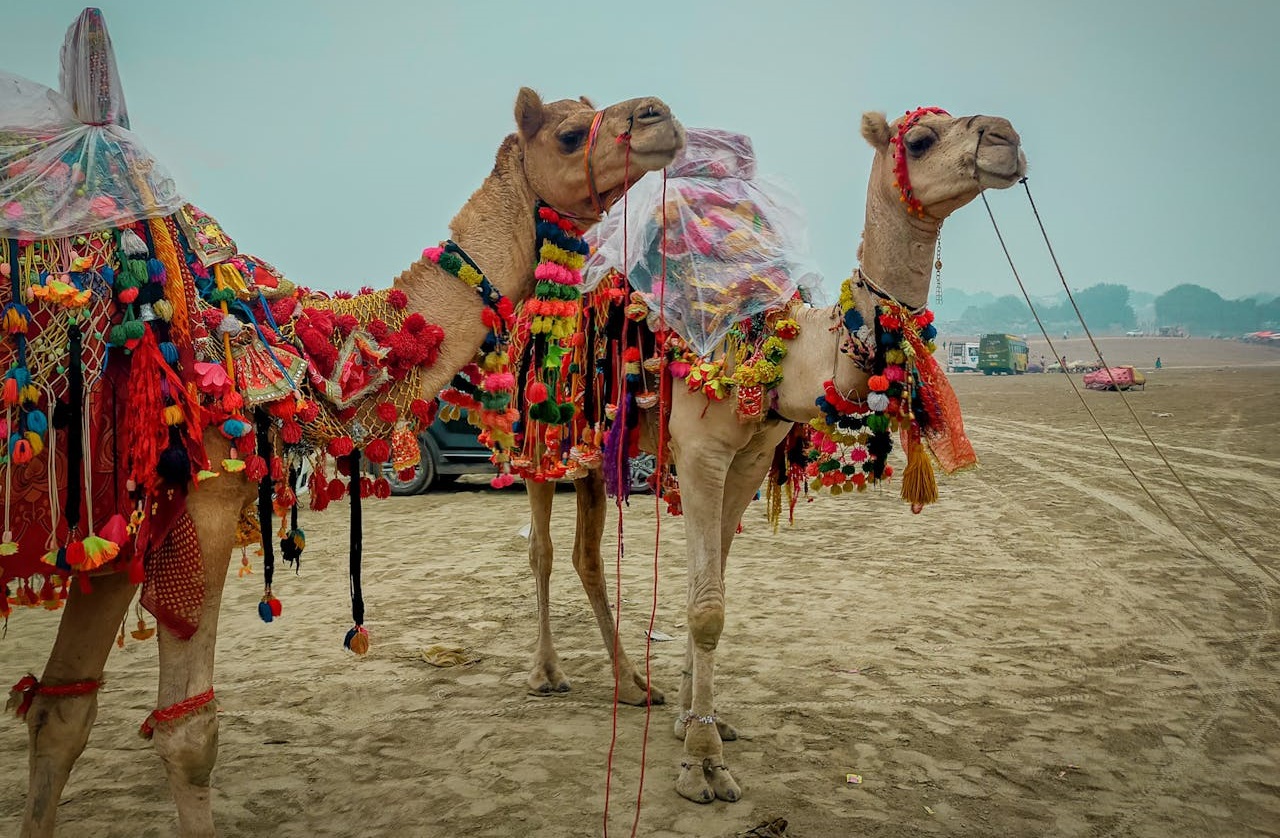Rajasthan: Land of Kings, Forts, Camels, and Colors
Rajasthan, the largest state in India by area, paints a captivating picture of vibrant colors, majestic forts, and rich history. Often referred to as the “Land of Kings,” Rajasthan boasts a legacy of Rajput dynasties who ruled the region for centuries, leaving behind a treasure trove of architectural marvels, cultural traditions, and a distinct identity. It is a colorful mosaic of culture, history, and scenic beauty. Situated in the country’s northwest, it is well-known for its imposing forts and palaces, vibrant festivals, and expansive desert vistas. Let’s delve deeper into the heart of Rajasthan, exploring its history, culture, landscape, and captivating experiences.

History
Rajasthan’s history stretches back millennia, with evidence of Indus Valley Civilization settlements dating back to 3300 BCE. The region witnessed the rise and fall of various empires, including the Mauryas, Guptas, and the Delhi Sultanate. Legends and folklore are abound about Rajasthan’s past, with tales of bravery, romance, and grandeur resonating through the state’s historic forts and palaces.
Several Rajput clans, each with its own kingdom and line of kings, historically called the area home. Magnificent forts and palaces were constructed by these Rajput kings as symbols of their might and opulence. Over the ages, the state saw many conflicts and victories, including incursions by Mughal and Maratha emperors. The colorful culture and history of Rajasthan’s princely republics are still very much alive today.

Architecture
Rajasthan boasts a multitude of architectural wonders that combine Mughal, Rajput, and Islamic styles. Famous sites like Jaipur’s Amber Fort, Jodhpur’s Mehrangarh Fort, and Udaipur’s City Palace can all be found in this state. With their elaborate carvings, imposing gateways, and expansive courtyards, these imposing buildings capture the splendor and refinement of bygone ages. Rajasthan’s architectural legacy can be seen in the elaborate frescoes found in the havelis of Shekhawati, the Jain temples of Ranakpur, and the enchanting lakeside palaces of Udaipur.

Culture
Rajasthan’s rich cultural heritage is exhibited through its vivid festivals, as well as through traditional dance, music, and food. The raw intensity and emotional depth of the state’s folk music attract audiences with its heartfelt melodies and rhythmic beats. The state’s folk music, with soulful melodies and rhythmic beats, resonates with raw energy and emotional depth. Folk dances from Rajasthan, such as Ghoomar, Kalbelia, and Bhavai, highlight the elegance and splendor of the area’s customs.

Cuisine
Rajasthani cuisine offers a delightful mix of flavors. The influence of its arid climate is evident in the use of lentils, pulses, and seasonal vegetables. Visitors’ taste buds are tantalized by the state’s cuisine, which is renowned for its flavorful and aromatic meals, such as gatte ki sabzi, laal maas, and dal baati churma. Dal Baati Churma, a hearty dish with lentils, fried bread, and crumbled flatbread, is a staple, while Laal Maas, a spicy mutton curry, tantalizes taste buds.

Festivals
Rajasthanis celebrate life with a multitude of festivals. Holi, the festival of colors, is a joyous explosion of vibrancy, while Diwali, the festival of lights, illuminates homes and hearts. The Pushkar Camel Fair, one of the world’s largest, showcases Rajasthan’s rich cultural heritage with camel races, vibrant performances, and a bustling marketplace. It is an cultural event where the desert comes to life and draws tourists from all over the world.

Desert Landscape
Rajasthan’s western part is dominated by the Thar Desert, commonly referred to as the Great Indian Desert, which is a wide area of dry landscape. The desert is brimming with life despite its harsh surroundings, with special plants and animals that have evolved to withstand it. Aside from exploring the dunes and taking in the peace of the desert, visitors can go on camel safaris.

Wildlife
There are a number of national parks and wildlife sanctuaries in Rajasthan, providing enthusiasts with the chance to see uncommon and endangered animals in their native settings. Sariska Tiger Reserve and Keoladeo National Park serve as birdwatcher’s paradise, while Bengal tigers may be found in large numbers at Ranthambore National Park. The state’s varied habitats are home to a wide range of animals, such as crocodiles, deer, leopards, and migrating birds.

Beyond the Tourist Trail
While these are popular experiences, Rajasthan offers much more. Explore the bustling bazaars of Jaipur, known for its colorful textiles and handicrafts, or visit the Bishnoi villages, known for their harmonious coexistence with nature. Learn the art of block printing, a traditional Rajasthani craft, or participate in a cooking class to master the art of Rajasthani cuisine.

Conclusion
In conclusion, Rajasthan’s timeless beauty, rich history, and gracious people are what make the state so alluring. Travelers are sure to be enthralled by the mysterious allure of the Land of Kings, whether they choose to explore the magnificent forts and palaces, fully immerse themselves in the colorful culture, or explore the desert landscapes. Everybody who travels through Rajasthan’s legendary landscapes is left with a lasting imprint by the state’s tradition of bravery, romance, and royalty.
